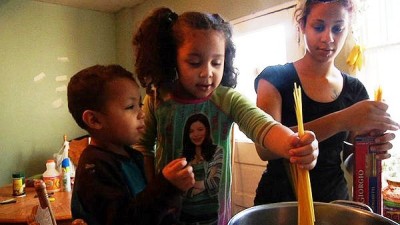
The biggest challenge for the well-intentioned, high-minded documentary is how to juggle the message with entertaining the audience. It’s a difficult balancing act that’s rarely achieved, as filmmakers must figure out a way to separate themselves from the tons of good-hearted docs out there, but without being so flippant that it distracts the viewer from the message.
Kristi Jacobson and Lori Silverbush’s A Place at the Table never quite attains the balance between entertainment and education when going for a human — and humane — look at hunger in America. And while it’s certainly a worthy cause, A Place at the Table is overstuffed with information and factoids — something that makes the film easily accessible to the converted and a difficult sell for everyone else. Jacobson and Silverbush begin by stating their thesis, focusing on the 50 million Americans who live in hunger, don’t often know where their next meal is coming from and live in poverty, but have difficulty even obtaining public assistance. This is shocking, especially since — and this is something the film touches on — hunger is rarely discussed openly in America, because of the cultural difficulty people have in admitting they’re underfed — although the condition is arguably a by-product of the country’s wealth.

What’s surprising about this doc is the solutions it brings up. Yes, there’s discussion about how government programs such as food stamps are faulty and don’t do enough to fill a need, but Jacobson and Silverbush are looking for causes that run deeper than simple policy. Instead, they’re searching for the root cause, mainly in the way American culture — and American thinking — hurts the poor. Basically, they’re taking a shot at capitalism (though never blatantly), the ‘80s Me Generation (including the Reagan era’s side effects of selfishness) and the dark side of the American idea of pulling oneself up by one’s bootstraps. What the filmmakers are calling for is a more institutionalized form of government assistance that’s ingrained within Americans looking out for one another — insisting that relying on charity, such as soup kitchens, can never get the job done.
This is certainly a worthy argument, but Jacobson and Silverbush present their ideas within the scope of data and hard facts. This academic approach is inevitable, but hunger isn’t a fun topic and shouldn’t be approached as one. Unfortunately, that also means A Place at the Table will be a tough go for most moviegoers, despite its having the best of intentions. Rated PG for thematic elements and brief mild language.
Starts Friday at Carolina Asheville Cinema 14




None too shockingly, this’ll be leaving us by Friday.
I found out that this was a thing only this afternoon, and I pay pretty close attention.
Well, it’s not like we were hiding it.